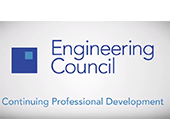Posting here an excerpt. Informative news.
2017 was a record year for EngTech registration.
|
 |
| Engineering Council's eNewsletter |
|
|
|
| The Engineering Council’s Annual Registration Statistics Report 2017 shows it was the fourth consecutive year in which new final stage registrations have increased, with the highest number of new Engineering Technicians (EngTech) ever recorded joining the Register. |
Continuing Professional Development (CPD)

Continuing Professional Development (CPD) is how professionally registered engineers demonstrate that they are enhancing their competence. …
And more on the website.

